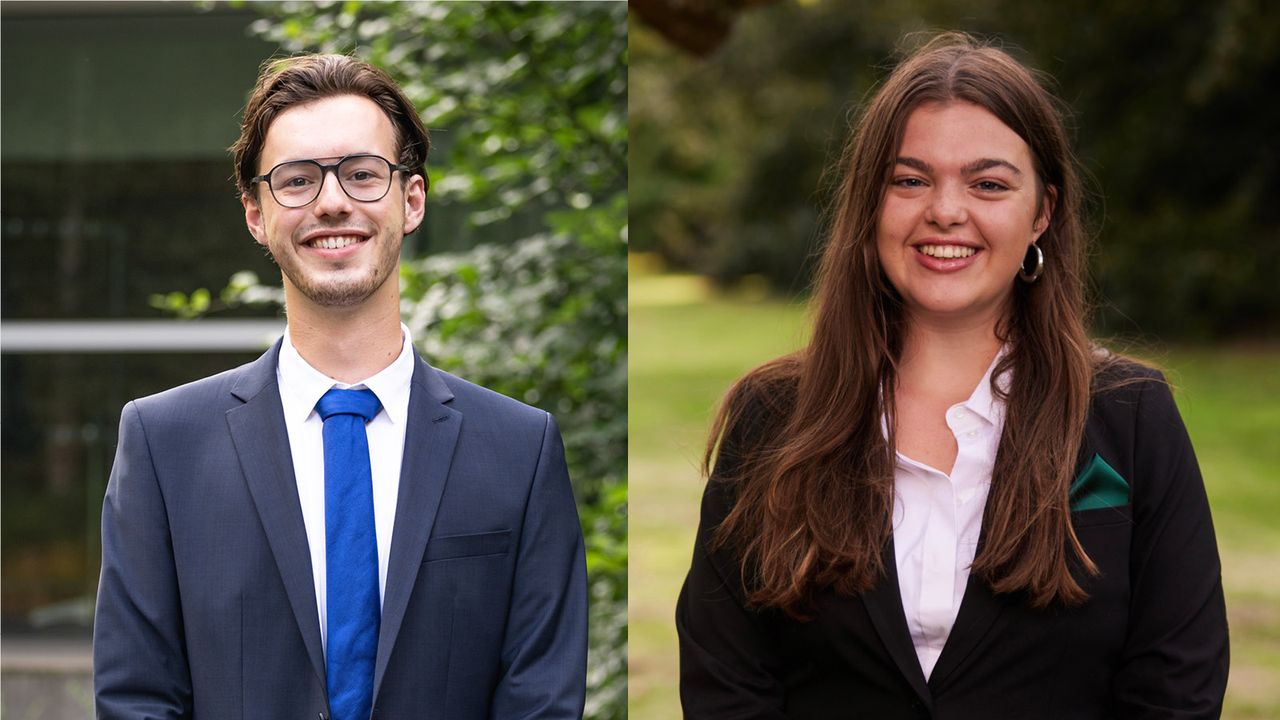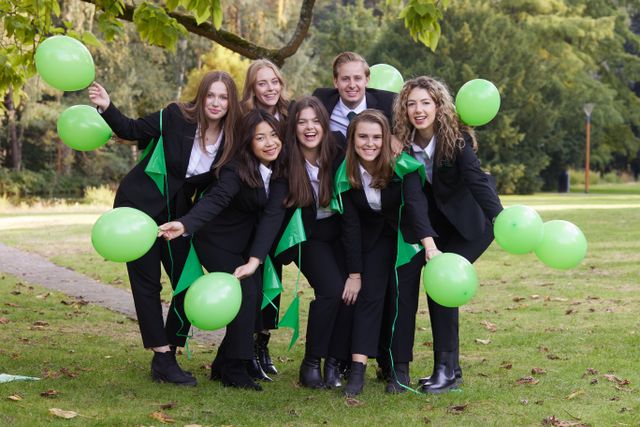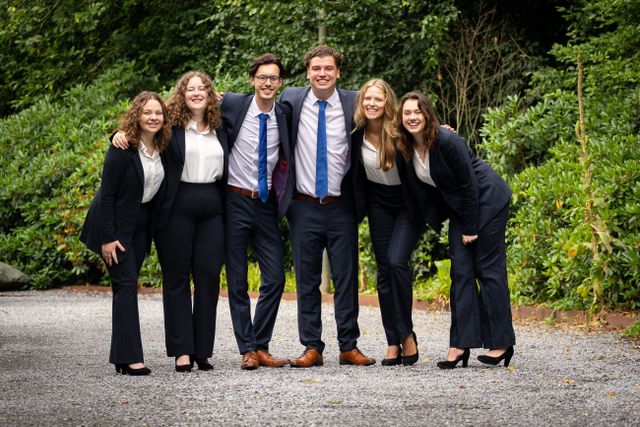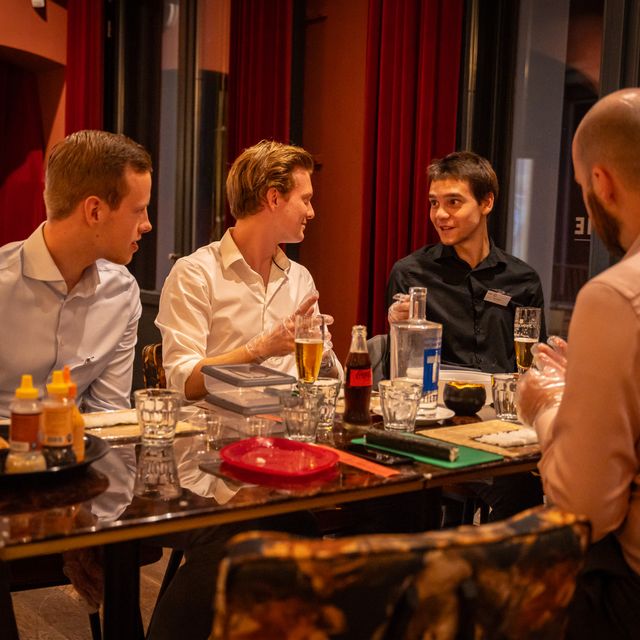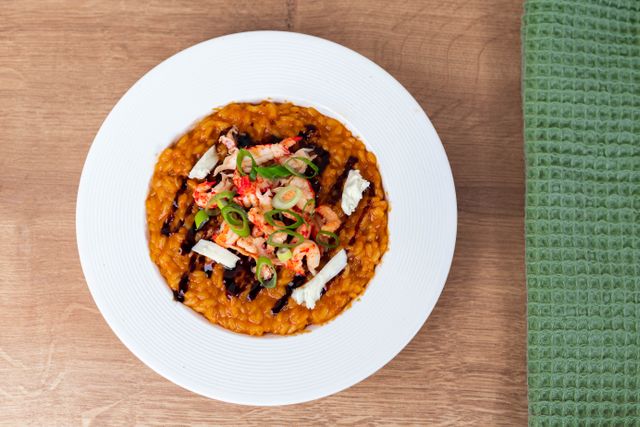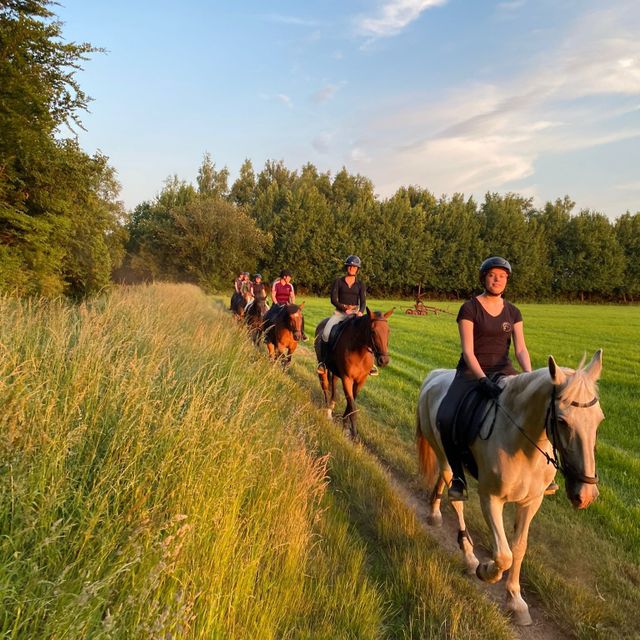A conversation with... SAM and Front
The University Council elections are upon us again! Next week the campus of Tilburg University will be colored green and blue again, and the lists of candidates are already all around. We spoke with Joost and Joëlle from the parties SAM and Front. What are they campaigning for and what does their ideal campus look like?
Who are you and what do you do for the party?
Joost: My name is Joost and I am currently the president of party SAM. Together with some other students, I am working full time for the party. SAM's mission is to represent and connect all students, that's what we are all doing, and we all do it in our own way.
Joëlle: My name is Joëlle and I am vice president of party Front at the moment. Together with the president, on the one hand, I deal with the external contacts, and on the other hand, I am also responsible for the political side around the facilities at the university.
What do you stand for as a party?
Joost: We try to represent all students, we don't have a biased position in that. Up here in building E a lot of student boards sit together. So it's very easy to contact the representatives of the different studies and faculties. As a group, you are very close to the various interests at the university. And then we always think 'who does this concern, and how can we best represent their interests?' That's how we try to be there for all students.
Joëlle: Front is here for the active student. So everything we do is based on that philosophy. We believe very much in the importance of developing yourself beyond your studies. We do mean 'active student' in the broadest sense of the word: every student who wants to take an extra step outside of studying. This can be volunteer work, or going on an exchange abroad, being a member of an association, you name it. We always look at policy documents from the perspective of the active student. So we mainly work towards an environment in which it is as easy as possible to do things besides your studies.
With what kind of initiatives do you support the students in Tilburg?
Joost: One of the things we are very proud of is that we managed to get a menstrual cupboard in the CUBE. This is a kind of cupboard with free products for everyone who menstruates. This was a pilot for now, but now there will also be coming one in the library. As a party we are very proud of this. We are also very proud of our couchsurfing initiative; Student Housing Tilburg. Of course we are representing the students of Tilburg, but we also look for ways in which we can connect students with the city. And so with this initiative we try to connect students who are looking for a place to live, to residents of Tilburg who might have a place over in their house.
Joëlle: We recently submitted an initiative on expanding the exchange procedure. First, this was mainly focused on the average of your grades; the higher your grade, the more chance you have of getting into your favorite destinations. We would like to change this so that your resume and motivation will also be taken into consideration. Or that there is some kind of point system, so that your extra curricular activities also count. Of course, we see that many active students choose to undertake many activities in addition to their studies and therefore do not necessarily have an 8 average for their subjects. This subsequently reduces their chances of going on an exchange. Once motivation, resume and possibly a points system are taken into account, it becomes more attractive for these students to be accepted. We have already worked out and submitted this initiative, and we hope to receive a response soon!
How are the preparations for the elections going?
Joost: We have the list of candidates, and we are preparing things for the campaign on campus. We have candidates on the list who are really looking forward to it. With new, fresh energy and new ideas. That of course motivates and inspires us as well!
Joëlle: Good! We are busy. We are very busy with how we are going to organize the elections on campus, what we are going to do and what online promotion is involved. And beyond that, it is very much up to the candidates to determine the content. This is important because they really have to be able to put their heart into the issues they are fighting for.
And then how does your election program come about?
Joost: We have a lot of "list pushers". This is a very diverse group; international students, active students at, for example, study associations, but also inactive students. We collect input from all these people to see what's going on in their world. This way we try to combine all these voices into a nice election program. Furthermore, we find it important that we present a realistic election program, which the candidates on the list fully support. You don't want to advertise plans that sound great and get a lot of votes, but which afterwards are not feasible.
Joëlle: In general, we base our policy on three pillars: internationalization, digitalization and living campus. In addition, we always address the perspective of the active student. We are also putting our efforts into digitalization again this year. We think it is important that certain things in terms of online education are included or that there will be flexibility in following lectures. And also the evening lectures, evening exams or weekend exams that are there now, we've been fighting for some time that those don't happen anymore, but that's a very long process so that's taken away every year.
If you were allowed to decide everything at the university, what would be something you would change immediately?
Joost: The university has pretty much abandoned online education since covid, even though we think there are still opportunities there. Implementing blended learning, for example. What components of online education do we want to bring to the education we have now? For example, knowledge clips or podcasts are things that we think would benefit the quality of education. There are already plans for this at the university so we are very happy with that. And you shouldn't rush into something like that because it's a whole shift in the way you teach. In addition, I personally would think it would be very cool if there was more room to take courses from another study or faculty in your minor. You can broaden your horizon with that, which is also very positive for your personal development.
Joëlle: The biggest thing we want to change, and with which I think we are also going to make a lot of students happy, is if lectures are recorded for everyone and also remain available for reference. We also wrote a letter about that this year and submitted it to the college. They are busy with blended learning, and we think that is a very good endeavor, but that process just takes a number of years. We think that students who are studying now should also be able to take advantage of that. It's very nice that they have plans for that now, but today's generation of students doesn't experience much of this anymore. From the online education in the covid period we also kept quite a few best practices. It seemed to us as if all innovation in that area, as soon as normal education was possible again in terms of covid, was completely dismissed again. Of course, we also want to make sure that the interaction during lectures remains and that people keep coming to campus, because we also like to see a vibrant campus. That is why we chose to aim to put the recorded lectures online a few weeks before the exams. We do think that could be a good middle ground.
What do you think Tilburg University will look like in 5 years?
Joost: In 5 years? Well then we will make use of all the possibilities that online education offers, as long as it all remains for the benefit of the quality of education. There are facilities like student psychologists, but also for housing. We as SAM are also in favor of bringing in international students, because of the diversity and different ways of thinking that you get. And then it is of course really important that there is enough housing. This is a dream scenario, that all of that is taken care of. We would also like the university to better prepare students for the job market, through extra courses for example. Now the gap from student life to the job market is a bit of a leap. In addition, it is also a real interest of ours that a student's mental well-being then takes precedence over performance. Of course you're here to study, but your mental well-being is also very important. You can pass all your courses, but if you're mentally not in a good place, what are we doing? Help is close at hand, but it shouldn't feel like a big step to ask for it. And then, of course, there are menstrual cupboards hanging in every toilet. In view of menstrual poverty, we think this is very important. Everything is obviously quite pricey lately, and it shouldn't feel like you can't get those products because you can't afford it. We also don't ask men or women to bring their own toilet paper, do we? So I would really like to see that in the future, I think all that is still realistic.
Joëlle: Five years from now, the university will still be nice and lively, and there will be many opportunities on campus for students to live there. The campus will still be a place where everyone feels at home, and there will be plenty of facilities to get together with friends and study. In addition, it will also be possible to take lectures at home or here on campus. The latest technologies and methods are used to ensure that you can design the education to suit you. Finally, students are encouraged and facilitated in doing extracurricular activities. These activities are fully recognized and the timetable provides sufficient space to actively participate in them. A concrete dream scenario, for example, would be that student administrators could be tuition-free administrators or become part of flex-study.
